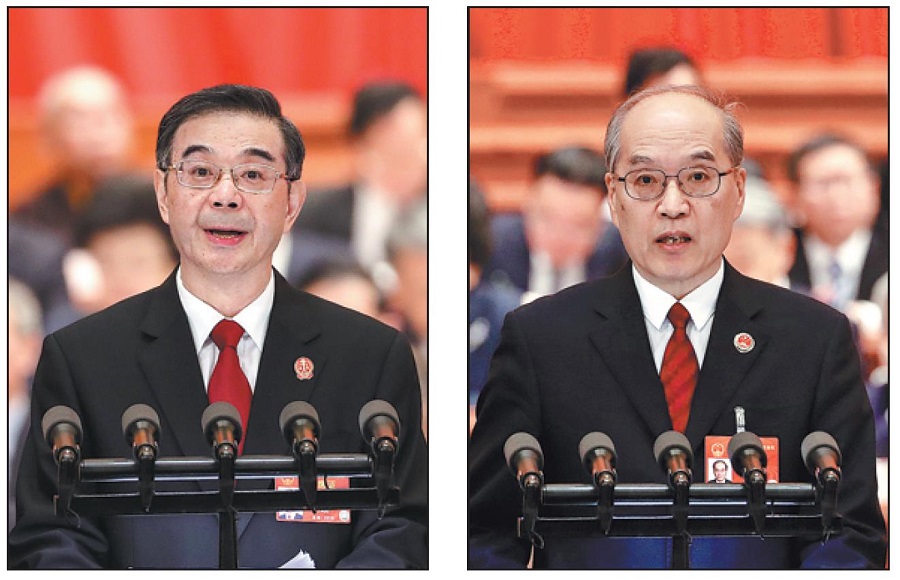


Chief Justice Zhou Qiang (left) and Procurator-General Zhang Jun deliver work reports in Beijing on Tuesday. [Photo by Feng Yongbin/China Daily]
Pressure still high on graft during supervision reform
China has kept up the pressure in the fight against corruption while making progress on reform of the country's supervision system in the past year, according to work reports of the top court and top procuratorate released on Tuesday.
Thirty-two officials at or above ministerial level were charged last year with graft, including Sun Zhengcai and Wang Sanyun, said Zhang Jun, procurator-general of the Supreme People's Procuratorate, during the work report to the top legislature.
Sun, former Chongqing Party secretary and former member of the Political Bureau of the 18th Communist Party of China Central Committee, was sentenced on May 8 to life in prison for taking bribes of over 170 million yuan ($25.3 million).
Wang, former Party secretary of Gansu province, stood trial in October, and no verdict has been released yet.
As a result of an unwavering resolve to bring the corrupt to justice, about 33,000 people in 28,000 cases were convicted of taking bribes or dereliction of duty last year, Chief Justice Zhou Qiang said in the work report of the Supreme People's Court.
Another 2,466 people were convicted of offering bribes last year amid a heavy crackdown on bribery, he said.
The large quantity of corruption convictions shows that China is unswervingly advancing the fight against graft, and reform of the country's supervision system has played its role, said Jiang Laiyong, a senior law researcher at the Chinese Academy of Social Sciences.
The 13th National People's Congress approved the amendment to the Constitution and the National Supervision Law in its previous annual session last March, laying a strong legal foundation for an upgraded anti-graft task force and bringing all people with public power under supervision.
Zhang said in his report that procuratorates have coordinated smoothly with supervision commissions at all levels to keep the pressure on corruption. "We have enhanced cooperation with the new commissions to push forward standards on work procedures and evidence collection to handle duty-related crimes," he said.
Supervisory commissions are State anti-corruption agencies. The National Supervisory Commission is the highest State supervisory organ, and all provincial, city and county-level regions have their own supervisory commissions.
Establishing supervisory commissions at all levels is considered a major political reform. Leaders of supervisory commissions are elected by people's congresses at the same level and are supervised by legislative bodies.
Prosecuting departments agreed to take a look at a total of 16,092 suspects alleged to have engaged in graft and who were handed over by supervision commissions nationwide, according to the SPP report.
Prosecutors charged 9,802 of them and decided not to charge 250 people, the report said. The others remain under investigation.
"The new commissions have integrated the country's scattered anti-corruption resources and cultivated a professional supervision team, serving as a powerful deterrent to corruption," said Guo Yong, director of the Center for Anti-Corruption and Governance at Tsinghua University.
Judicial and procuratorial organs have also kept a close watch on mafia-like gangs and crimes that affect people's daily life such as pollution and drug security.
Prosecutors charged 61,188 suspects involved in organized crime or local mafias last year, and about 350 people were charged with serving as a "protection umbrella" for such criminals, according to the SPP report.
Zhang said prosecutors were guided by the principle of "no one is let off, no one is wronged" while handling such cases, and struck down 9,154 cases filed by police as gang-related crimes.
In cases linked to pollution, 42,195 suspects were prosecuted for damaging the environment and resources last year, an increase of 21 percent year-on-year, he said.

 Award-winning photos show poverty reduction achievements in NE China's Jilin province
Award-winning photos show poverty reduction achievements in NE China's Jilin province People dance to greet advent of New Year in Ameiqituo Town, Guizhou
People dance to greet advent of New Year in Ameiqituo Town, Guizhou Fire brigade in Shanghai holds group wedding
Fire brigade in Shanghai holds group wedding Tourists enjoy ice sculptures in Datan Town, north China
Tourists enjoy ice sculptures in Datan Town, north China Sunset scenery of Dayan Pagoda in Xi'an
Sunset scenery of Dayan Pagoda in Xi'an Tourists have fun at scenic spot in Nanlong Town, NW China
Tourists have fun at scenic spot in Nanlong Town, NW China Harbin attracts tourists by making best use of ice in winter
Harbin attracts tourists by making best use of ice in winter In pics: FIS Alpine Ski Women's World Cup Slalom
In pics: FIS Alpine Ski Women's World Cup Slalom Black-necked cranes rest at reservoir in Lhunzhub County, Lhasa
Black-necked cranes rest at reservoir in Lhunzhub County, Lhasa China's FAST telescope will be available to foreign scientists in April
China's FAST telescope will be available to foreign scientists in April